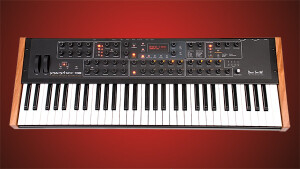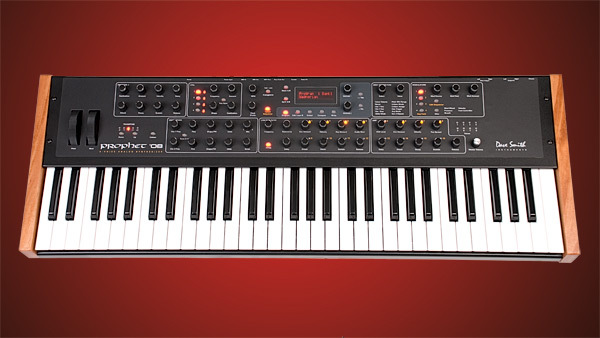P8 ou A6, comment choisir ?
- 271 réponses
- 39 participants
- 12 642 vues
- 35 followers
jeffdevigneux
Je m'apprêtais à acheter un P8, quand j'ai appris que la production de l'A6 Andromeda était relancée.
Qu'est-ce qui déterminerait à votre avis le choix de l'un ou de l'autre ?
Deviens ce que tu es.
yohda
http://www.vintagesynth.com/forum/viewtopic.php?f=1&t=28215&st=0&sk=t&sd=a&start=90
Citation : Hi all,
Wonderful thread.
I was part of the development team for the A6. I just want to reminisce a bit because I have some wonderful memories bringing this baby alive.
I was responsible for the sound engine on the synth. My partner on the project, Phil, worked on the outer coding; programs and mix mode and most of the GUI. We both developed the electronic circuitry for the main boards.
We were hired as contractors by Alesis and so worked in our shop instead of at Alesis. We of course had many meetings with the team, we had extra time with Rob Rampley talking about microprocessor interface issues.
We were basically given at the beginning of the project a nice specification, and the design of the front panel, and the (still in development but mostly done) ASIC chips. And a keyboard with a nice Alesis keyboard scanning ASIC.
Rob helped us pick out a processor - the Motorola 32 bit Coldfire was just being manufactured and fit our needs pretty well. By the way, the newer versions of the Coldfire chip would work very nicely for a possible upgrade...
So it's time for a confession. When I started on this project, I wasn't really sure what a synthesizer was. Sure, I love music. My dad was a singer and taught my about vibrato at a young age. But that's all I knew about LFOs. But Phil knew all the technical stuff, and I started a quick learning curve. My previous experience was programming real time embedded systems for the visual effects industry; camera controllers and miniature model movers and sometimes remote control explosive triggers. I had written a complete motion control package for optical printers at just the time when they were being supplanted by digital visual effects. I figured that the A6 project was the same king of programming that I had been doing, just moving sound waves instead of motors, with the added benefit that if I messed up, only eardrums would hurt instead of broken bones from a runaway motor. Also, I figured that my synth-based inexperience would be a good thing for the project because I didn't have any pre-conceived notions of how things have been done in the past, and could approach problems from a different perspective.
I ended up using almost all of the capabilities of the processor. I'm proud of the 1 bus cycle DMA data transfer algorithm that clocks the voice data to the ASICs and only takes up 14% of the processor bandwidth.
I remember the first time a sound came out of the ASICs. I especially remember the incredible, wild sounds that happened when I sometimes made a programming error. Even from only one voice.. Sounds that I've never heard before or since. Should have recorded them...
So I learned and programmed the LFOs, envelopes, sequencers and arpeggiator, sample and holds. I made the modulation matrix. Another thing I'm proud of is the "Control routes", or modulating a modulation. This wasn't in the original specification and I found that it was a logical addition to what I was doing. So I added it into a version and they added it to the spec.
I made the background tuning algorithm, but it's the temperature tuning that was a spark of fun in the process. The dev team said that the oscillator ASICs had a theoretical temperature offset curve. They gave me the function, it had 2 unknown constants and 2 variables. I took massive amounts of data, basically looking at how different ambient temperatures affected different frequencies, these being the 2 variables in the function. I filtered the data and found a few possible constants that would fit. I remember playing with those constants and when I found them, they fit across the whole audio spectrum. So the temperature tuning is just a real time calculation using the temperature function, not table based or anything. That felt good.
I tried during the whole process to make the engine run as fast as possible. The relatively slow LFOs and envelopes are basically as fast as possible with the available processor bandwidth. See my above comment about newer processors.
We talked about tuning individual VCAs in the ASICs, and as was said previously, it was possible but would have taken more programming time than was available.
I wish I could have developed a faster way to program the seq/arps, but again that was what could be done given everything else that needed to be done. Alesis took over the software from us around version .23 or so.
I am so glad that this synth is working like it should, as a versatile musical tool. By the way, somebody mentioned the word 'bug' - I don't think so! Excuse me! Not on my A6! That spontaneous program change was probably dirty knobs like Mr. Peake said.
I've recently listened to A6 demos on UTube and other places with A6 patches. Wonderful and inspiring. I'm really proud of being part of this wonderful instrument. By the way I have an A6 serial number 23. Still sounds great but I did have to replace the battery on the main board.
So if somebody (Alesis? ) happens to want to upgrade the synth I am already on record as being more than willing to help. I'm currently back making camera robotics and loving it.
Thanks for letting me remember!
Sympa d'avoir des histoires des concepteurs!
Il y a aussi un message de Mike Peake sur la page précédente.
Ce serait vraiment une excellente idée d'upgrader le processeur pour pouvoir disposer de modulations plus rapide!
fzik
Mon ordi portable est en réparation. J'aurais la réponse demain soir, histoire de savoir, si c'est grave ou pas ! Donc si je suis obligé de changer l'ordi, le clavier devra attendre son tour
www.uyuni.net - - Découvrez notre premier CD - - https://soundcloud.com/uyuniprod - - https://www.facebook.com/uyuniprod
Acher
http://fr.youtube.com/watch?v=3kDHKcOQ0vQ
Bonne écoute.
ménélassou
Ce synthé est capable de sortir des sons de toute beauté
Puissance et finesse au rendez-vous.
Cette démo montre qu'il est tout sauf fade
Acher
ménélassou

Docteur Frog
L'A6 prendrait toute la couverture et le P08 aurait un peu froid... sur le plan sorore c'est rien de le dire.
Tiens, pour info, un ami possesseur de Prophet 5 midifié vient de faire l'acquisition du Prophet08 DSI. Il avait déjà acheté le Laptop Prophit5 de Creamware qu'il a revendu... on imagine pourquoi.
Et bien il va..., il va, ... revendre son P08.
...pour trouver un Omega8 ou un A6 d'occasion (rouge si on peut : collector). Il y en a d'occaz aux US.
.: La musique, c'est minimum deux fois par jour, matin et soir après les repas :.
ménélassou
Anonyme
Citation : Entièrement d'accord. Le P08 se ferait manger tout cru.
L'A6 prendrait toute la couverture et le P08 aurait un peu froid...
Docteur Frog
.: La musique, c'est minimum deux fois par jour, matin et soir après les repas :.
- < Liste des sujets
- Charte




